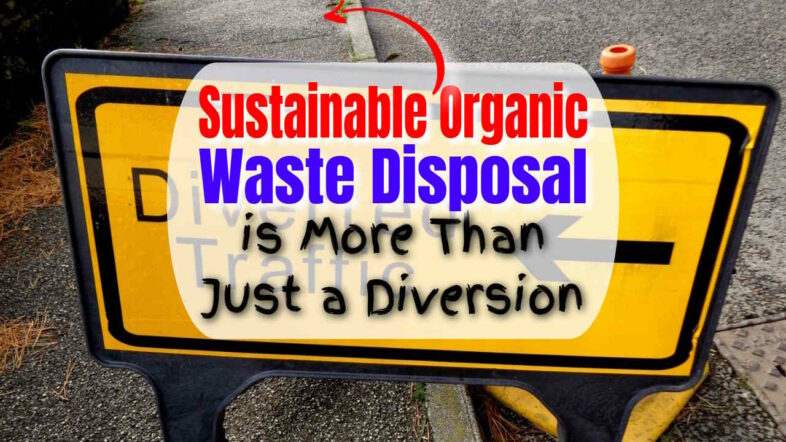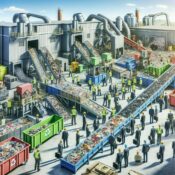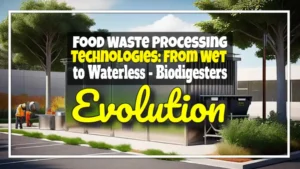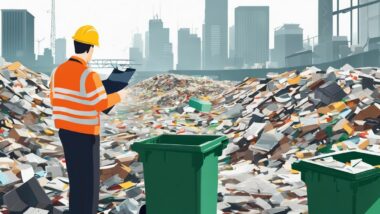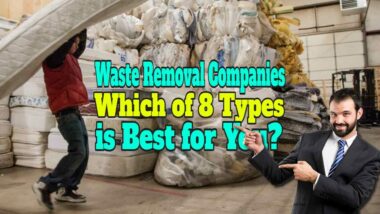In recent years waste management experts often talk about diverting organic waste from landfills. In this article, we explain why diversion is just the first step in a virtuous circle toward much more sustainable organic waste disposal. Read on to find out why sustainable organic waste disposal is more than just a matter of diversion.
Diverting Organic Waste from Landfills: Reducing Methane Emissions and Creating Valuable Resources through Composting
Organic waste, including food waste and green (garden or yard) waste, makes up a significant portion of the waste stream in many communities. When organic waste is sent to landfills, it decomposes anaerobically, which produces methane, a potent greenhouse gas. Methane is a major contributor to climate change, and reducing its emissions is critical to mitigating the impacts of global warming.
One way to reduce methane emissions from organic waste is through diversion. Diverting organic waste from landfills involves separating it from other types of waste and processing it in ways that either recycle it or turn it into useful products. This can include composting, anaerobic digestion, or other forms of recycling.
While diversion is an important part of sustainable organic waste disposal, it is not the only benefit. In fact, organic waste can be a valuable resource when it is diverted into other forms of recycling.
Composting is one example of how organic waste can be transformed into a useful product.
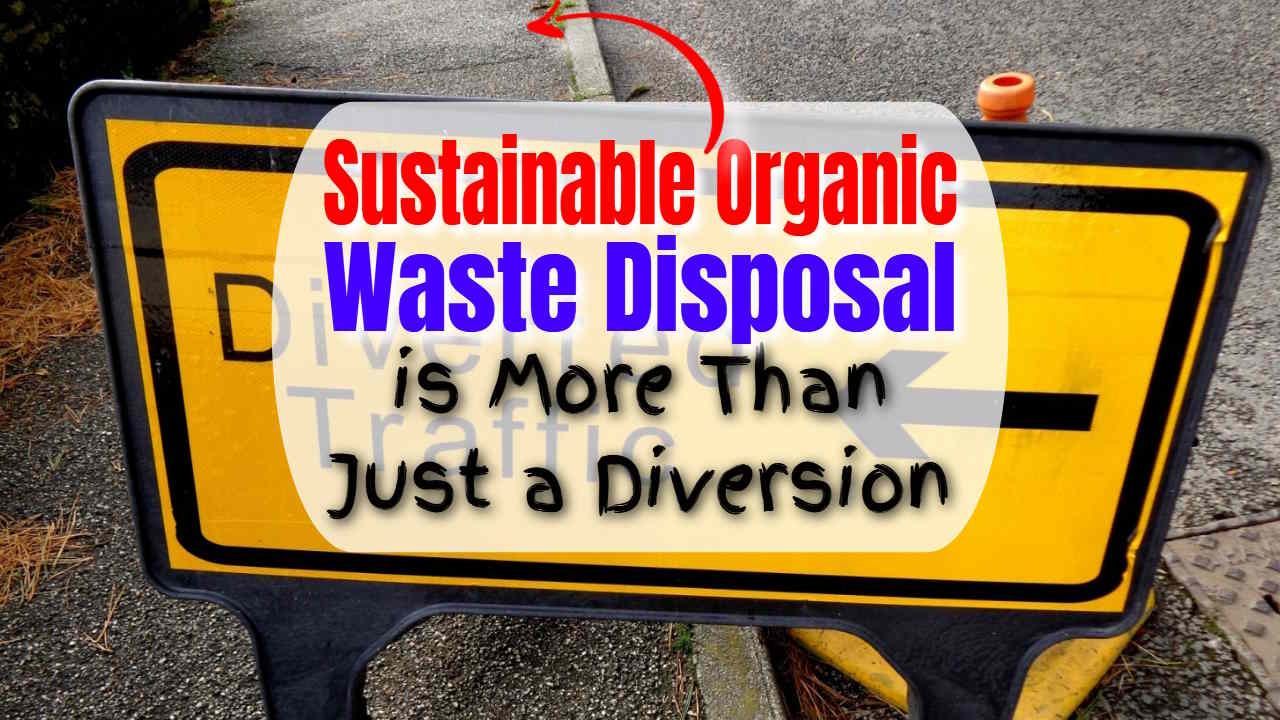
Recycling Organic Waste: Composting and Anaerobic Digestion for Sustainable Agriculture and Energy
When organic waste is composted, it is broken down into a nutrient-rich soil amendment that can be used in landscaping and agriculture. Composting also helps to reduce the need for chemical fertilizers, which can be harmful to the environment and human health.
Another way to recycle organic waste is through anaerobic digestion. Anaerobic digestion is a process that uses microorganisms to break down organic waste in the absence of oxygen. This produces biogas, which can be used as a renewable energy source. Biogas can be used to generate electricity, heat buildings, or fuel vehicles.
The Benefits of Sustainable Organic Waste Disposal: From Reducing Greenhouse Gas Emissions to Promoting Food Security

Diverting organic waste into recycling not only helps to reduce greenhouse gas emissions but also creates new economic opportunities. Composting and anaerobic digestion facilities can provide jobs and stimulate local economies. By diverting organic waste from landfills, communities can also reduce their reliance on fossil fuels and decrease their carbon footprint.
In addition to the benefits of recycling organic waste, there are also social and environmental benefits to reducing food waste. Food waste is a major contributor to hunger and food insecurity, both globally and locally. Reducing food waste can help to ensure that food is available for those who need it, and can also help to reduce the environmental impacts associated with food production.
But, very possibly many readers are wondering more about what exactly we mean by organic waste disposal. If so the next section will interest you:
Organics Waste Disposal
Organic waste is a type of waste that includes green waste, food scraps, paper, non-hazardous wood waste and vegetation landscape materials. It is an important component of recycling which can be a win-win-win for the environment because diverting it away from landfills:
- reduces the quantity of greenhouse gases created by landfills,
- reduces the output of other pollutants from landfills
- provides a feed (fuel) to run anaerobic digestion plants which means that instead of making greenhouse gas it does the opposite and provides a much-needed source of renewable energy.
To minimize the amount of organic material going into landfills, many cities around the world have implemented programs and technologies to divert waste from landfills. This includes composting and anaerobic digestion.
Sustainable Landfill Diversion Means that Food Scraps Become an Asset and are No Longer a Problem
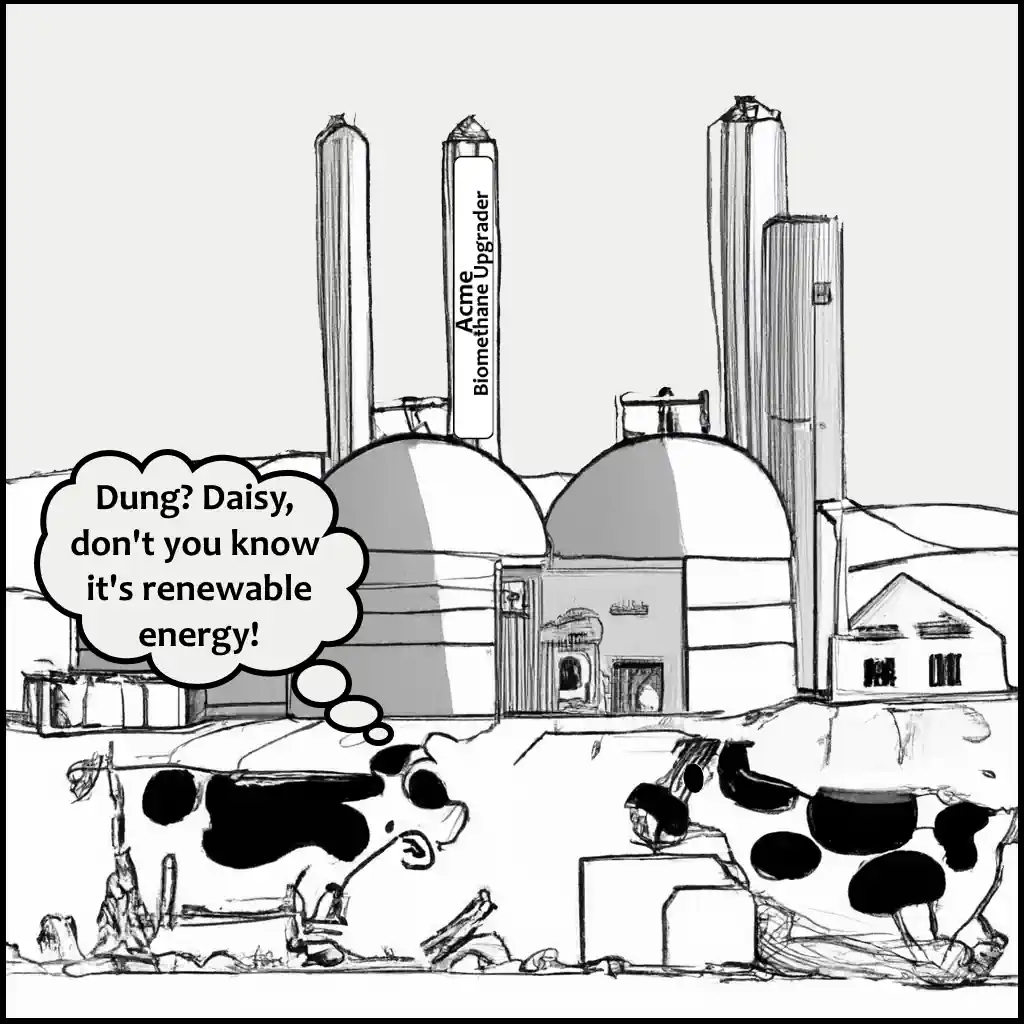 Food waste is a huge problem that comes in many forms. Mountains of rejected fruits and vegetables at farm warehouses, dumpsters full of out-of-date yoghurts, and a plethora of wasted leftovers from grocery stores and restaurants.
Food waste is a huge problem that comes in many forms. Mountains of rejected fruits and vegetables at farm warehouses, dumpsters full of out-of-date yoghurts, and a plethora of wasted leftovers from grocery stores and restaurants.
When food waste is sent to landfills, it decomposes slowly, without oxygen. This process releases methane, a greenhouse gas 84 times more potent than CO2 over a 20-year period.
Feeding organic waste to anaerobic digestion plants followed by composting the digester output reduces methane emissions and turns food scraps into a nutrient-rich fertilizer that can be used in gardens, farms and landscaping.
It also conserves landfill space, prevents water pollution and preserves soil nutrients.
For example, in addition to residential curbside compost collection, DSNY operates over 50 Food Scrap Drop-off locations across the city to provide a sustainable alternative to sending your organic waste to the landfill.
Paper Scraps are Recycled as Waste
Every paper artist has a pile of paper scraps that they just can't seem to get rid of. Whether it's a messy stack on a tabletop or a neatly organized collection in a box, this stash of paper scraps is often a big source of frustration.
However, waste paper can be digested along with food waste to produce biogas in an anaerobic digestion plant.
Yard Trimmings are a Form of Green Waste
Yard trimmings, such as grass clippings, leaves, and weeds, can be recycled as mulch for gardens and as compost. They contain nutrients that help the soil hold water, improve plant growth, and reduce soil erosion.
Aside from the potential to provide free mulch, yard waste recycling also has environmental and economic benefits. By diverting waste from landfills, we are reducing the amount of greenhouse gas emissions released into our environment.
Composting can also be a cost-effective solution to dispose of yard trimmings. By processing them in a composting facility, we can save money on transportation and landfill space while providing nutritious compost.
However, composting facilities are often confronted with contaminants such as hoses, film plastic bags, and other non-degradable materials that can lower the quality of the finished product. This is particularly true for a composting facility that receives food waste as well.
The depackaging machine range by Drycake Twister is used to separate organic food waste from curbside waste collections.
Wood is Yet Another Organic Waste Once Discarded
Wood is a renewable, recyclable material that can be repurposed for several different purposes. It is a versatile resource that can be used to make products such as furniture, flooring, and shingles.
When you are trimming a tree or building a home, there is usually a lot of wood that is leftover after the project is complete. Most people just toss it in their trash, but there are a few things you can do with it that will help keep it out of the landfill and put it to good use!
If you have scrap lumber from home improvement projects, you can take it to a municipal recycling centre. It can be chipped and made into mulch or compost or turned into particleboard or chipboard lumber.
In addition, some private companies that create home and garden products will take it as a raw material for their products. This can be a great way to turn wood waste into a valuable resource for your home and garden.
Join the Movement: Promoting Sustainable Organic Waste Disposal for a Greener Planet
In conclusion, sustainable organic waste disposal is more than just a diversion.
While diverting organic waste from landfills is an important step, there are also significant benefits to recycling organic waste into useful products like compost and biogas.
By doing so, communities can reduce their greenhouse gas emissions, create new economic opportunities, and promote food security and environmental sustainability.
It is up to all of us to do our part to reduce our waste and support sustainable organic waste disposal practices.
Ramp Method of Waste Disposal – Landfill Guide & Techniques
The ramp method optimizes landfill operations by creating an inclined surface, allowing efficient waste compaction and daily cover application. Unlike traditional methods, it requires minimal excavation, reducing costs and extending landfill lifespan. Proper implementation and equipment maintenance are key to effective ramp method performance in various terrains…
The Circular Economy In Fashion: Making Clothes Sustainable
Fast fashion fills our wardrobes, but most clothes end up in landfills within a year. Introducing the concept of the circular economy in fashion. It's the best hope for making our clothes sustainable. The global clothing industry creates over 92 million tonnes of waste each year, making it one of Earth's biggest polluters. A circular […]
Can You Visit a Landfill Site in the UK?
Can You Visit a Landfill Site in the UK? Have you ever wondered if you can visit a landfill site in the UK? Many people think about what happens to their rubbish after it gets taken away. So, why not go and see one? Not an old one, long since covered in soil and made […]
The Evolution of Food Waste Processing Technologies: From Wet to Waterless Biodigesters
Read on for the latest news on the development of wet and waterless biodigesters as a means of processing Food Waste. As food waste management becomes an increasingly pressing issue for environmental sustainability, the evolution of waste processing technologies has been a game-changer in how we handle organic material. For decades, the food waste processing […]
